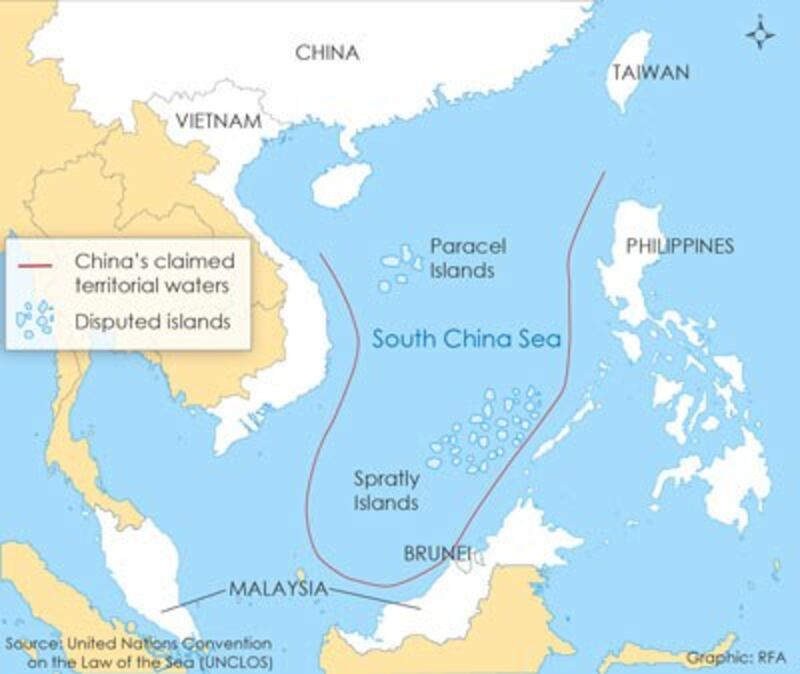Leaders attending a regional summit defied calls by China not to discuss territorial disputes in the South China Sea at the forum, with U.S. President Barack Obama calling for a reduction of tensions in the area that experts say is Asia's biggest potential military flashpoint..
Chinese Premier Wen Jiabao warned Obama and other leaders at the 18-nation East Asia Summit that Beijing does not want its maritime disputes with several members of the Association of Southeast Asian Nations (ASEAN) brought to the regional talks.
“We do not want to bring the disputes to an occasion like this,” Wen said at one of the summit’s final sessions on Monday, according to Chinese Vice Foreign Minister Fu Ying.
“China’s act of defending its sovereignty is necessary and legitimate … and we have properly handled the incidents that were not the making of China.”
ASEAN members Vietnam, the Philippines, Malaysia, and Brunei, as well as Taiwan, have claims to parts of the potentially resource-rich South China Sea.
China insists it has sovereignty rights over virtually all of the waters and prefers to settle the disputes on a country-by-country basis instead of having the disputes “internationalized.”
Obama urged a cooling of heads on the issue when the 10 ASEAN nations were joined by eight other states including the U.S. and China for the East Asia Summit on Tuesday.
“President Obama’s message is there needs to be a reduction of the tensions,” U.S. Deputy National Security adviser Ben Rhodes said after the summit.
“There is no reason to risk any political escalation, particularly when you have two of the world’s largest economies—China and Japan—associated with some of those disputes,” he said.
China is also involved in a territorial row with Japan after Tokyo bought disputed islands known as Senkaku in Japan and Diaoyu in China from a private Japanese owner in September, triggering violent protests and calls for boycotts of Japanese products across China.
The U.S., which China has said should not interfere in discussions on the South China Sea, has said it will not take sides in the disputes but will do what it takes to protect nations’ access to shipping lanes.
Intra-ASEAN discord
But divisions over whether ASEAN nations will press their claims with China as a bloc or individually had tensions running high at the bloc’s annual summit.
Cambodia, a China ally and this year’s ASEAN Chair, said that that all 10 leaders of the bloc had agreed in a meeting on Sunday not to “internationalize” their disputes, instead reaching an agreement to limit their dispute to the bloc’s talks with China.
“Concerning the South China Sea issue, the ASEAN leaders have agreed to continue to resolve the issue through existing ASEAN-China mechanism,” Cambodian Prime Minister Hun Sen said in a 30-minute speech wrapping up the ASEAN meetings on Monday.
But the Philippines, which plans to bring its own dispute with China to a U.N. tribunal, has lodged a formal protest against Cambodia, accusing the China ally of stifling discussion on the disputes, according to Reuters news agency.
Philippine President Benigno Aquino said that his country and at least one other country—which many believe is Vietnam—had not agreed to limit their discussion with China on the disputes to the ASEAN-China mechanism.
The bickering was reminiscent of the ASEAN foreign ministers meeting in July, which ended without issuing the customary joint statement for the first time in the grouping’s 45-year history because of divisions over the disputes.
DOC

Leaders of ASEAN and China had met on Monday to commemorate the 10th anniversary of their Declaration on the Conduct of Parties in the South China Sea (DOC), an agreement that sets out a commitment to work toward a code of conduct aimed at avoiding clashes in the waters.
The talks passed without any agreement on a code of conduct, but the countries reaffirmed their commitment to the DOC.
A joint statement released at the end of the meeting said the countries undertook to “work together for the adoption of a code of conduct in the South China Sea on the basis of consensus.”
“We all agree to value the implementation and respect of the DOC based on the principles adopted in 2011 to boost mutual trust and confidence,” Hun Sen said.
He added that ASEAN leaders support Thailand’s taking a role in coordinating meetings between ASEAN and China in negotiations to formulate a code of conduct.
Wen Jiabao also told leaders at the East Asia Summit that China is committed to moving forward with the DOC.
“Premier Wen Jiabao stressed that China is ready to implement the DOC in a comprehensive manner and has worked with ASEAN members to maintain cooperation,” Fu said, according to Chinese state news agency Xinhua.
Senior officials from the member countries and China have conducted informal talks on the Code of Conduct earlier this year in preparation for the summit.
Reported by RFA’s Khmer service. Translated by Samean Yun. Written in English by Rachel Vandenbrink.
